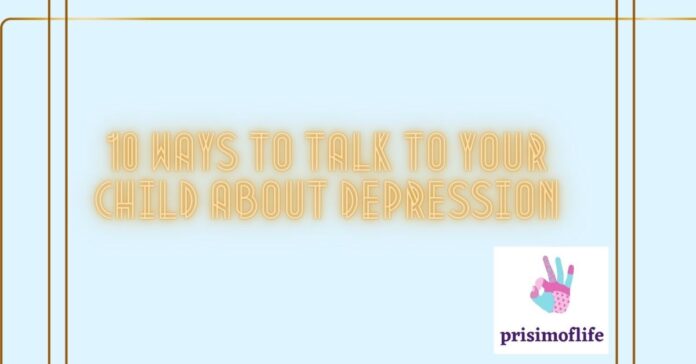The article, 10 ways to talk to your child about depression will equip you with better understanding of childhood depression and how to talk about it. Talking to your child about depression can be difficult, especially when it’s something you’ve been experiencing yourself. But you’re not alone. Depression affects millions of people in the United States every year. However, there are steps you can take to minimize its effects on your child’s life (and yours). Here are ten tips that will help you have these conversations in the most effective way possible.
Depression affects people of all ages, so it’s natural that as your children get older, they might experience depression too. Talking to your child about depression can be difficult because you don’t want to imply that you think he or she will experience it in the future. Bbut it’s also important to have open lines of communication if your child does experience depression symptoms. In this article, we’ll talk about how to talk to your child about depression in age-appropriate ways. Also, how not to scare them or further their confusion if they do end up developing depression at some point in their lives.
1) Be Open
Talking to kids about mental health is hard enough as it is. But being honest with them while they’re not in crisis can make a huge difference. It starts with acknowledging that there are some really tough conversations we need to have with our children; we don’t want to tell them how easy it will be or how simple it will seem.
Instead, stress that these conversations can be uncomfortable at first, but they’ll help your child feel more supported. You might even say you know how tough these discussions are and admit that you don’t have all of the answers yourself. Most importantly, let them know you’re here and willing to listen whenever they’re ready for a difficult conversation.
2) Encourage Their Creativity
Whether you realize it or not, creativity is an important part of mental health. Depression is a heavy burden for anyone to carry. But having a creative outlet can help you process thoughts and feelings in new ways. Encourage kids (and adults) to take up a creative activity that they enjoy. It could be drawing, playing an instrument, or designing something new. Creative activities open up space for emotions and thoughts by taking focus away from negative thoughts and bringing it back into the moment. Making something out of nothing allows us to focus on what’s happening in our lives instead of what we wish was happening.
3) Make Them Listen
Bring up a couple of questions you may have, but then turn it around and ask them how they feel. This is a way for kids to open up on their own terms. If they don’t want to talk, that’s fine too. Let them know that you’re always there when they do want to discuss it. They may be embarrassed or worried what other people will think if they tell friends that someone in their family has had a depressive episode. Therefore, assuring them they can come and talk at any time is often more helpful than asking directly if everything is okay.
4) Give Them Time
Many children who are feeling depressed will not come out and say so. If you notice changes in your child’s behavior, especially if it lasts for more than a few days, ask what is going on. Be patient; many kids dealing with depression aren’t ready to discuss their feelings right away. It may take some time for them to open up, but remain supportive throughout that process.
5) Create a Comfort Zone
When talking with a depressed person, remember that you’re not going to fix them. When someone is in a depressed state, their ability to reason and think clearly is diminished. While you can’t make them feel better, it’s still important for them to know that you care about their feelings and are there for support.
You should avoid telling them what they should or shouldn’t be feeling and instead listen when they want or need to talk. If they don’t want help, respect that as well. Encourage family members, friends, or professionals who are trained in therapy if it seems like your loved one needs more professional assistance than you can provide alone.
6) Give Them a Candid Support
For many people, telling a loved one they’re depressed can be hard. After all, it’s not something you hear much about—especially in younger generations. If you know someone who is depressed, it is imperative that you let them know that it’s OK to feel what they are feeling and that there are plenty of resources available. You don’t have to have all of the answers; instead try just listening and letting them know that you care.
7)Love Them
You might also encourage them to reach out for support from other trusted adults, such as a teacher or counselor. Open communication is very important, so make sure you don’t dismiss their concerns by saying that everyone feels like that sometimes. If you sense that your loved one is struggling with clinical depression or another mental health issue, be prepared to get help. Remember If you don’t ask, you don’t get!
8) Positive Reinforcement
Showing them that you take time out for yourself is a great way to open up a discussion on mental health. If they see you doing it, they might come to realize that taking care of themselves is an important part of their own mental health. For example, take a day off from work and do something fun with your kids together. A positive, non-stressful activity can be an excellent jumping off point for talking with kids about their own mental wellbeing.
9) Perfoem Engaging Tasks
The best way to find out what’s going on with a friend or loved one is to ask them directly. Ask, Are you feeling depressed If they say yes, ask, Have you felt that way for a long time Ask, How are you coping with it right now Try and get them talking without bringing up any negative feelings of yours.
Make sure they know that what they’re feeling is normal and that there are resources available if they want them. According to an international survey in 2017 by BBC 5 live, there were 4.2 million people in Great Britain alone who had suffered from some form of mental illness over the past year – so remember There’s no need for embarrassment and every reason for frankness.
10) Get Them Council
Reach out and seek help when you need it. If you’re feeling depressed, reach out to friends and family, get counseling or even see a therapist. Don’t be afraid to let people know what you’re going through. You can also lean on coping mechanisms such as listening to music or watching movies—or simply taking a time-out and walking in nature. The point is that any form of positive release will help alleviate stress—and feeling better will help you return back into society.
See Also:










